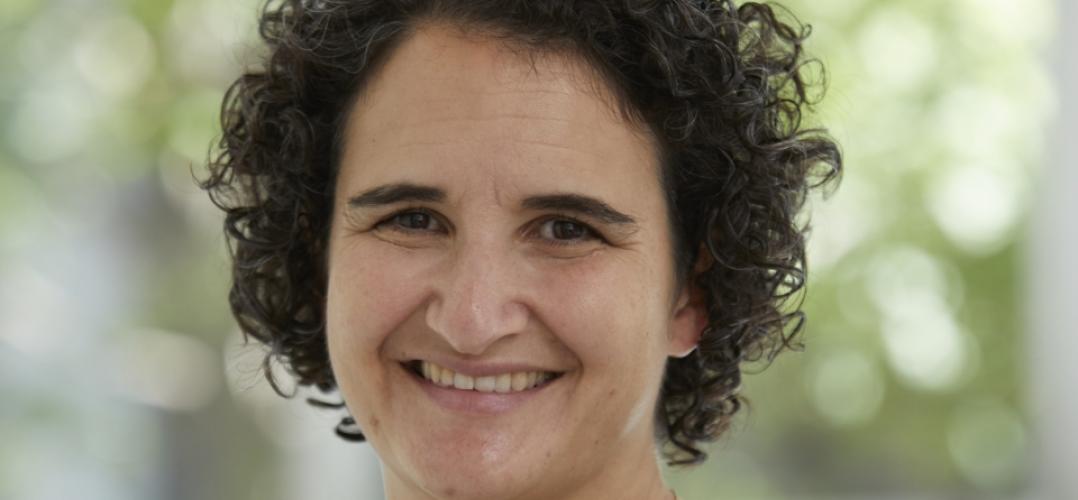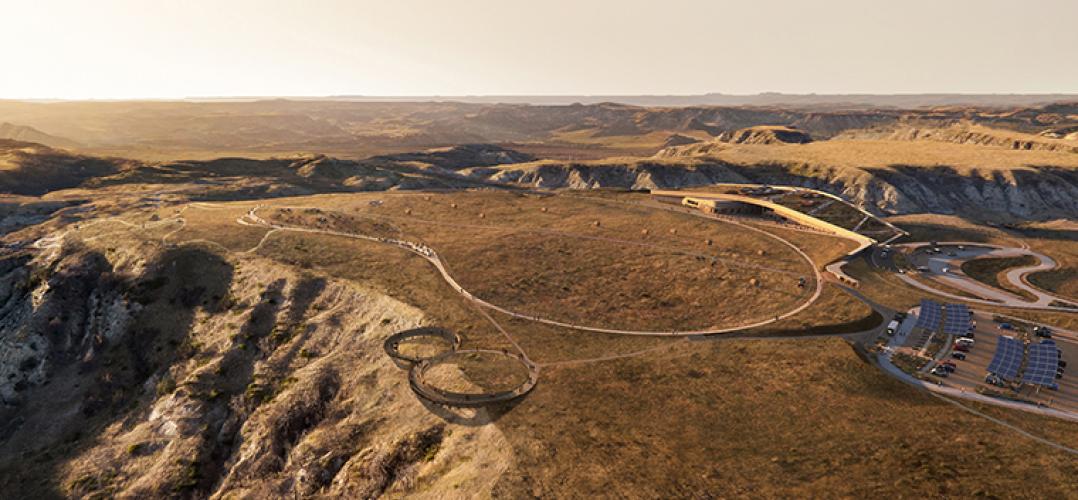Join our mailing list and receive invitations to our events and updates on our research in your inbox.
News + Events

Popowsky Named Wilks Family Director at McHarg Center
We are very excited to share the news that award-winning landscape architect, researcher, and educator Rebecca Popowsky has been named the Wilks Family Director of The McHarg Center, effective January 1.
Rebecca has a long history with Penn, having earned her MLA and MArch degrees here in 2010. She most recently served as a research associate and the OLIN Labs coordinator at the internationally renowned landscape architecture firm OLIN, where she co-led its internal research practice since 2018. Developing innovations in waste-based material design and construction, soils engineering, and practice-based research models, she established partnerships in the public, private, nonprofit, and academic sectors. In her capacity as landscape designer at OLIN, Rebecca contributed to a wide range of design, planning, and construction projects. She joined the Penn faculty in 2015 and has taught core and advanced design studios and professional practice courses in the Department of Landscape Architecture. Rebecca succeeds Billy Fleming, who was instrumental in conceiving and producing many of the Center’s public programs and contributed to numerous research initiatives, including as co-editor of Design with Nature Now, which was recently published in Chinese and traditional Chinese translations. Billy has been appointed assistant professor of landscape architecture in the Tyler School of Art and Architecture at Temple University, where he joins several other Penn alumni on the faculty there.

The Anne Whiston Spirn Lecture: Michelle Delk, “Snøhetta Landscapes”
Michelle Delk, the Laurie Olin Professor of Practice in Landscape Architecture at Penn and partner with Snøhetta in New York City, will deliver the inaugural Anne Whiston Spirn Lecture. Delk’s lecture, Snøhetta Landscapes, will focus on her recent work with the firm, where she leads the landscape architecture practice in the Americas.
Delk’s work is evocative of a foundational premise shared with Snøhetta: to create places that enhance the positive relationships between people and their environments. Both aspirational and pragmatic, she seeks to discover and expand the urban landscape vernacular, striving to express the subtleties of place through the incongruities of memory, envi¬ronment, and social perceptions. Delk is a Fellow with the American Society of Landscape Architects, a board member with New York’s Urban Design Forum, and a member of the Cultural Landscape Foundation Stewardship Council.
The Anne Whiston Spirn Lecture is presented annually by The Ian L. McHarg Center for Urbanism and Ecology to showcase a practitioner or scholar in the field of landscape architecture whose work expands the disciplinary boundaries of research and practice. Housed in the Department of Landscape Architecture at the University of Pennsylvania Stuart Weitzman School of Design, The McHarg Center was launched in 2019 as a transdisciplinary platform for collaborative research supporting the future of life on Earth. The lecture honors Anne Whiston Spirn (MLA’74), a Penn alumna who led the Department of Landscape Architecture as chair from 1986-1994 and whose work inspires deeper engagements with people and planet.
Thursday, February 6, 2025
6:30 pm - 8:00 pm
Kleinman Energy Forum, Fisher Fine Arts Library, 4th Floor, 220 South 34th Street, Philadelphia
If you require any accessibility accommodation, such as live captioning, audio description, or a sign language interpreter, please email news@design.upenn.edu. Please note, we require at least five (5) business days’ notice.

Architectures and Ecologies of Amazonia
Architectures and Ecologies of Amazonia is an interdisciplinary international symposium and exhibition highlighting the agencies that have shaped and are shaped by Amazonia. Threatened by deforestation, fire, and drought, the Amazon rainforest, which spans nine countries, is home to more than thirty million people. It is the ancestral homeland of more than one million Indigenous peoples and supports the greatest concentration of biodiversity on Earth. In the face of the widespread socio-environmental challenges we currently face, along with the existential threat of crossing the environmental tipping point of the Amazon rainforest, the symposium aims to share lessons that the study of the Amazon can teach us about climate action, coexistence, and the built environment.
The symposium was organized by Vanessa Grossman, Assistant Professor, Department of Architecture, and Catherine Seavitt, Meyerson Professor of Urbanism and Chair, Department of Landscape Architecture, in collaboration with Fernando Lara, Professor, Department of Architecture and Kristina Lyons, Associate Professor of Anthropology. A parallel exhibition of student work is on display in the Mezzanine Gallery of Meyerson Hall through May 1, 2025. The exhibition is designed by Jonathan Bonezzi and Ryan Lane Thomas.
Architectures and Ecologies of Amazonia is co-hosted by the Department of Architecture, the Department of Landscape Architecture, and the McHarg Center for Urbanism and Ecology. The symposium also received generous support from several programs and initiatives across the University, including the Perry World House International Visitors Grant Program, the Department of Anthropology, the Center for Experimental Ethnography, the Center for Latin American and Latinx Studies, and Native American and Indigenous Studies at Penn.

Stream 'Landscape Futures' on YouTube
On September 27 and 28, 2024, the Department of Landscape Architecture presented Landscape Futures: Centennial of the Department of Landscape Architecture. The program included keynotes from James Corner (MLA’86) and Anne Whiston Spirn (MLA’74), as well as three panels moderated by landscape architecture faculty, all of which can be streamed on YouTube.
The Naturalist
With Jared Farmer, Sally Willig, Tessa Lowinske Desmond
Moderated by Sean Burkholder Jared Farmer, PhD, is the Walter H. Annenberg Professor of History at the University of Pennsylvania’s School of Arts and Sciences. Sally Willig, PhD, is a lecturer and program advisor in the Master of Environmental Studies program at the University of Pennsylvania’s College of Liberal and Professional Studies and Weitzman’s Department of Landscape Architecture. Tessa Lowinske Desmond is a research specialist in the School of Public and International Affairs at Princeton University, where she directs The Seed Farm at Princeton. Sean Burkholder is the Andrew Gordon Assistant Professor of Landscape Architecture at the Weitzman School of Design.
The Astronaut
With M. Christine Boyer (MS’64), Andrew Zolli , Alvin D. Harvey
Moderated by Azzurra Cox
M. Christine Boyer, PhD, is the William R. Kenan, Jr. Professor of Architecture and Urbanism at Princeton University’s School of Architecture, where she directs the undergraduate urban studies certificate program. Andrew Zolli is Chief Impact Officer at Planet, a space and AI organization that has deployed the largest constellation of Earth-observing satellites in history. Alvin D. Harvey, PhD, is Diné of the Navajo Nation and a postdoctoral fellow at MIT’s Department of Aeronautics and Astronautics, with a focus on Indigenous Research Methodologies and Methods. Azzurra Cox is an assistant professor of landscape architecture at the Weitzman School of Design.
The Household of Nature
With Sonja Dümpelmann, Lydia Kallipoliti, Rob Holmes
Moderated by Nicholas Pevzner (MLA’09)
Sonja Dümpelmann is Professor and Chair of Environmental Humanities at the Ludwig Maximilian University of Munich, where she co-directs the Rachel Carson Center for Environment and Society. Lydia Kallipoliti is an associate professor and director of the Master of Science in Advanced Architectural Design program at Columbia University’s Graduate School of Architecture, Planning, and Preservation. Rob Holmes is an associate professor and chair of the undergraduate landscape architecture program at Auburn University, where he leads the Landscape Infrastructure Design Lab. Nicholas Pevzner is an assistant professor of landscape architecture at the Weitzman School of Design.